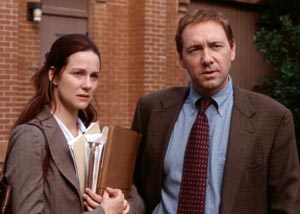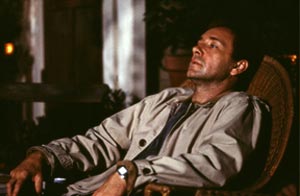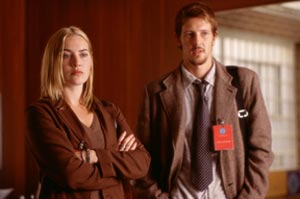Old Stuff
The Life of David Gale (2003)
Directed by Alan Parker
Kevin Spacey is mesmerizing as the title character in "The Life of David Gale." He's an anti-death penalty activist who is to be executed for the murder of one of his closest associates, Constance Hallaway (Laura Linney). "Doesn't that strike you as a little strange?" Gale blurts out to Bitsey Bloom (Kate Winslet), the reporter he handpicks to tell his story in the last few days of his life. Every actor in their respective roles is convincing. Unfortunately the stars outshine the material. This is not surprising, considering that director Alan Parker has a knack for getting the best out of his actors even in the movies that misfire.

"Angel Heart" (1987) had a very credible Mickey Rourke as a detective hired by a mysterious Robert De Niroto to find a missing man who may or may not exist; and "Road to Wellville" (1994) boasted some remarkable ensemble performances that included the then relatively unknown Camryn Manheim. Anthony Hopkins played health maven John Kellogg, the father of the Kellogg food industry. But much like that film, "The Life of David Gale" tries to cover too much ground.

"The Life of David Gale" has a message about a faulty legal system and the execution of innocents, especially in Texas where the story takes place, home of President Bush, which plays well in the first half, but it is betrayed by the machinations of Charles Randolph's screenplay. Most of Gale's story is told in flashback. Is he guilty or not guilty? Winslet's Bitsey listens attentively to his tale of infidelity, alcoholism and betrayal. She begins to believe he was framed. Bitsey is determined to accomplish what his lawyer failed to do; prove his innocence. It all looks too easy. Therein lies the rub. What started out as a message movie turns into a quasi thriller with the victim's old boyfriend as the primary suspect; hints are dropped like neon signs right from the get-go. The elements in The Life of David Gale mix like oil and water and never coalesce into a cohesive whole. The film tries to tie up its loose ends when it morphs into a tale of redemption. It doesn't work because no one is truly innocent. Everyone in the movie is guilty of something whether through complicity or ignorance. Bitsey Bloom becomes a victim of her own pride. The surprise twist that comes at the end turns out to be not all that surprising.

Without giving the end away, I hope, I have to say that the reporter, Bitsey Bloom, who champions Gale's cause would, on the basis of everything that precedes it, follow her journalistic credo and publish the truth. The fact that you're led to believe she won't is totally out of character and undermines the movie's message about the injustices of the criminal justice system. -- Rating: $2.00
Five of the Best from Director Alan Parker
Midnight Express (1978)—Brad Davis is real life Billy Hayes who was caught in Turkey trying to smuggle drugs out of the country. The movie was praised for its suspense and reviled for its violence. The scenes in prison are brutal and the ones of Hayes escaping, exciting. John Hurt is a standout as a prison addict who has given up on life. Giorgio Moroder and Oliver Stone both won Oscars for the music and screenplay respectively.
Fame (1980)—Before the TV series, there was the movie!—A dramatic and musical look at New York's High School for the Performing Arts (now part of La Guardia High School). The dance scene in Times Square around the statue of George M. Cohan is a knock out. It was an Oscar winner for its music. The cast of relative unknowns, at the time, included Paul McCrane, Barry Miller (Saturday Night Fever), Irene Cara, and Laura Dean.
Shoot the Moon (1981)—If you want to see what a fine actress Diane Keaton is, this is the one to see! It's a devastating look at the dissolution of a marriage, a slash-your-wrists movie that is positively mesmerizing because of the all-too-real interplay between Keaton and Albert Finney. The gut wrenching screenplay is by Bo Goldman. The rest of the fine cast includes Peter Weller, Karen Allen, and Tracy Gold.
Mississippi Burning (1988)—Gene Hackman does a variation on Popeye Doyle from The French Connection as an FBI agent investigating the death of Civil Rights Activist in Mississippi. Willem DaFoe is his by-the-book partner.
The Commitments (1991)—Youthful working class Dubliners band together to form a sixties style soul group with exhilarating results. The timelessness of the music speaks for itself. Colm Meany is the father figure who lends his support in this adaptation of the first in a trilogy of stories by Robby Doyle. (Meany also starred in the next two adaptations, Snapper (1993), and The Van (1996)).
Two personal favorites from Alan Parker
Birdy (1985)—Great Mathew Modine as a Viet Nam Vet who thinks he can fly like a bird. Nicholas Cage plays his best friend. The ending has an element from the end of Frank Capra's Meet John Doe (1941). It is abrupt and the main character has a change of heart. View both and see what you think.
Come See the Paradise (1990)—Dennis Quaid plays a union activist who marries into a Japanese family in the thirties in Los Angeles. Pearl Harbor is bombed and his Japanese family endures life in the internment camps. Interesting for its depiction of a piece of American history that is rarely portrayed on the screen.
Greg Murray -- copyright 2003